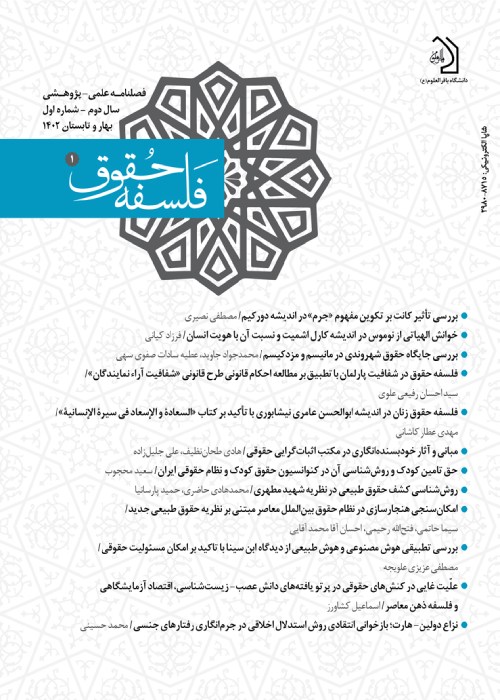A Comparative Study of Artificial Intelligence and Natural Intelligence from Ibn Sina's View point with an Emphasis on the Possibility of Legal Liability/Tort Law
Author(s):
Article Type:
Research/Original Article (بدون رتبه معتبر)
Abstract:
The distinction between natural intelligence and artificial intelligence (AL) is one of the concerning issue of intelligence researchers. The creators of artificial intelligence are attempting to simulate the structure and function of the human brain in the light of the progress of neuroscience and cognitivism, as well as in the light of the theories proposed in the philosophy of mind with an emphasis on functionalist and behavioristic view. On the other hand, psychologists such as Ibn Sina(Avecina) have analyzed the differences between natural human intelligence and artificial intelligence in their philosophical psychology. The human soul, as the source of human intelligence and life, has various perceptive and stimulating capabilities regarded as the armies of the soul. The main question of the current research is what are the outstanding advantages of natural intelligence over artificial intelligence from Ibn Sina's point of view. In this research, efforts have been made to answer that in the light of the rational-analytical method. In the measurement between artificial intelligence and natural intelligence, there are three types of artificial intelligence, namely: weak, medium and strong. The results indicates the nine main differences between these two types of intelligence from Ibn Sina's point of view: creativity vs. innovation, compositional composition, detail orientation, focusing on a specific area of self-awareness, self-discovery, the internal evolution of natural intelligence, the power of narcissism, moralism, the power to remind and reminisce. Considering all the differences between artificial intelligence and human intelligence, it is appropriate to distinguish between the current state and the future state of artificial intelligence in terms of legal liability and torts law. According to the current situation, artificial intelligence lacks legal will and merely based onthe theory of legal instrumentalism can be emphasized. However with regard to the futuristic perspective of artificial intelligence, assuming the realization of the existing characteristics of the soul, it is possible to imagine such liability or tort law for .
Keywords:
Language:
Persian
Published:
Journal of Philosophy of Law, Volume:2 Issue: 1, 2024
Pages:
227 to 246
magiran.com/p2687521
دانلود و مطالعه متن این مقاله با یکی از روشهای زیر امکان پذیر است:
اشتراک شخصی
با عضویت و پرداخت آنلاین حق اشتراک یکساله به مبلغ 1,390,000ريال میتوانید 70 عنوان مطلب دانلود کنید!
اشتراک سازمانی
به کتابخانه دانشگاه یا محل کار خود پیشنهاد کنید تا اشتراک سازمانی این پایگاه را برای دسترسی نامحدود همه کاربران به متن مطالب تهیه نمایند!
توجه!
- حق عضویت دریافتی صرف حمایت از نشریات عضو و نگهداری، تکمیل و توسعه مگیران میشود.
- پرداخت حق اشتراک و دانلود مقالات اجازه بازنشر آن در سایر رسانههای چاپی و دیجیتال را به کاربر نمیدهد.
In order to view content subscription is required
Personal subscription
Subscribe magiran.com for 70 € euros via PayPal and download 70 articles during a year.
Organization subscription
Please contact us to subscribe your university or library for unlimited access!


